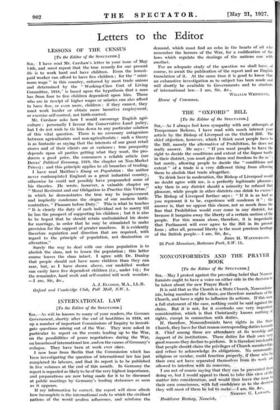THE " OXFORD " BILL [To the Editor of the
SPECTATOR.] SIR,—As I always feel keen sympathy with any attempts at Temperance Reform, I have read with much interest your article by the Bishop of Liverpool on the Oxford Bill. The chief objection, however, which I think most people have to the Bill, namely the alternative of Prohibition, he does not really answer. He says : "If you want people to have the right to decide the conditions. and extent of the liquor traffie in their district, you must give them real freedom to do so but surely, allowing people to decide the "conditions and extent" of a trade is a very different thing from allowing them to abolish that trade altogether.
To drink beer in moderation, the Bishop of Liverpool would no doubt agree with me, is a perfectly legitimate pleasure; -Why then in any district should a Minority be refused that Pleasure, while people in other districts can drink to excess? The Bishop of Liverpool further says: 'If it is as bad as you represent it to be, experience will condemn it " ; the answer is, that we oppose this clause, not so much from the fear that Prohibition would ever come in any district, but because it bargains away the liberty of a certain section of the people. For this reason alone, therefore, it is improbable that Parliament Will ever agree to the Bill in its present form ; after all, personal liberty is the Most precious heritage of the British people.—I am, Sir, &e., JOHN H. WAINWRIGHT.










































 Previous page
Previous page